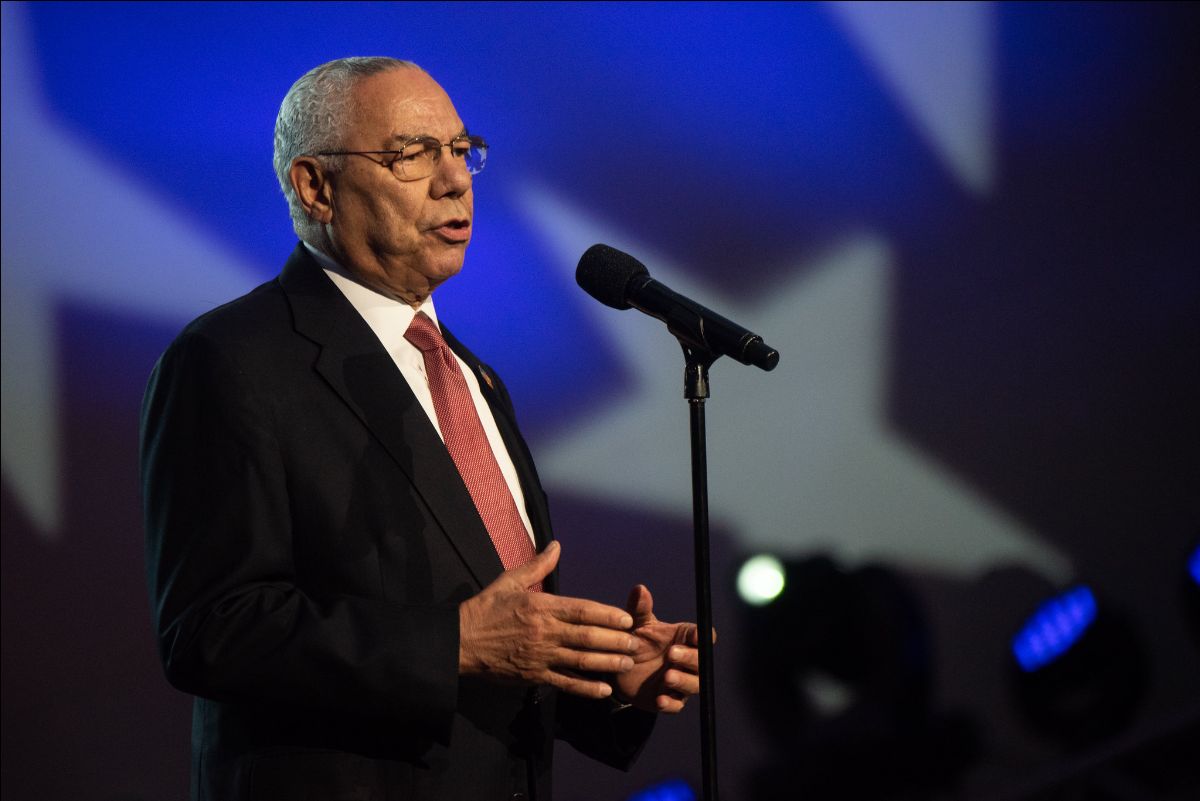Top photo: Former U.S. Secretary of State Colin Powell speaks during the National Memorial Day Concert on the west lawn of the U.S. Capitol on May 27, 2018. (Photo: U.S. Department of Defense / U.S. Army Sgt. James K. McCann)
Welcome to Factal Forecast, a look at the week’s biggest stories and what they mean from the editors at Factal. We publish our forward-looking note each Thursday to help you get a jump-start on the week ahead. You can subscribe for free.
A look ahead:
Nov. 5/ Colin Powell memorial service: An invitation-only memorial service will be held Friday for Colin Powell, the retired four-star Army general and former U.S. secretary of state, at Washington National Cathedral. The Cathedral will have a live stream of the service, which is scheduled for 12 p.m. ET.
- What’s happened so far: Powell died Oct. 18 at age 84 due to complications from coronavirus. He was fully vaccinated but suffered from serious underlying health conditions, including multiple myeloma, a blood cancer that can harm the body’s immune system, as well as Parkinson’s disease. In 2001, Powell became the first Black secretary of state under President George W. Bush. His tenure was marred by a 2003 U.N. address in which he cited faulty information to claim that Saddam Hussein had weapons of mass destruction, sparking the U.S. invasion into Iraq. Powell later expressed regret over the remarks.
- The impact: Many military and Congressional leaders are expected to attend the memorial service. Seating will be limited with safety protocols in place. Bush said in a statement last month that he and former First Lady Laura Bush were “deeply saddened” by Powell’s death, adding “he was highly respected at home and abroad.”

Nov. 5/ China to hold import trade fair: China will hold its fourth annual “import-themed” week-long trade fair, the China International Import Expo, beginning Friday in Shanghai.
- What’s happened so far: Started in 2018 at the onset of a trade war with the United States, the exposition aims to promote China’s domestic market to foreign companies, show its commitment to an open economy and boost domestic consumption. In 2020, the trade fair went ahead as planned despite the coronavirus pandemic but drew a smaller crowd of exhibitors and visitors. This year, nearly 60 countries, three international organizations and 3,000 businesses from 127 countries and regions will participate, according to official figures.
- The impact: Schools and businesses in Shanghai have been ordered to close during the event. Though it’s touted as one of China’s leading trade expos, some foreign businesses say the event is largely symbolic as the fair focuses on buying foreign goods with no attempt to address what critics call structural issues within China’s economic and trade practices. This year, the expo is expected to focus on new business opportunities as the economy attempts to recover.
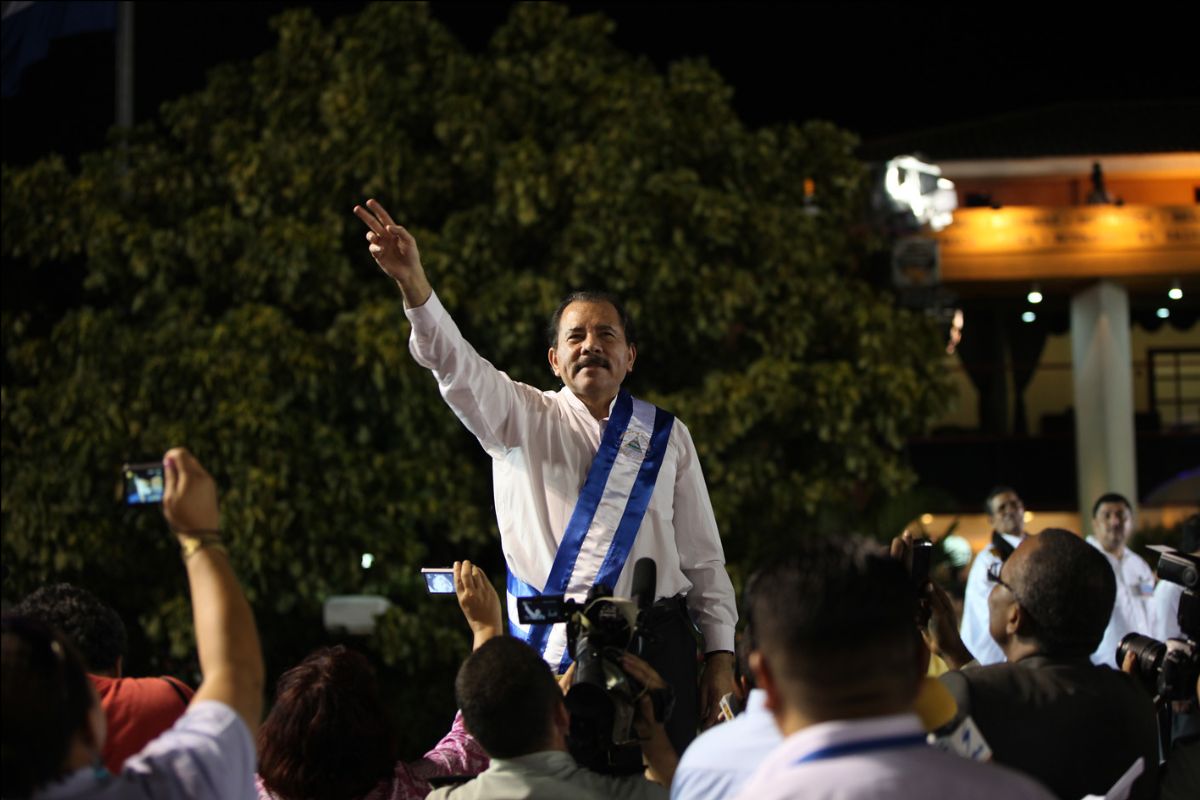
(Photo: Foreign Ministry of Ecuador / Flickr)
Nov. 7/ Nicaraguan election: Nicaragua will hold general elections Sunday without the participation of the opposition and with international organizations warning about authoritarianism in the country.
- What’s happened so far: President Daniel Ortega will seek his fifth term on Nov. 7 after 11 years in power thanks to a 2014 law that abolished term limits for presidents. A socio-political crisis has developed in the lead-up to the election, with the government censoring critical press and the international community questioning democratic standards in the country. At least 39 opposition leaders and activists have been arrested for treason, including seven presidential candidates who sought to challenge Ortega. Three opposition parties and 50 NGOs were banned, and more than 150 people are believed to have been imprisoned arbitrarily.
- The impact: More than 4 million Nicaraguans are expected to vote Sunday. It will be the first election since 2018’s nationwide protests, during which more than 300 people were killed due to police brutality, according to the Inter-American Commission on Human Rights. The Nicaraguan opposition called on citizens to boycott the elections, claiming irregularities and unfair conditions. Preliminary results are expected on Nov. 15.
Nov. 8/ U.S. expands coronavirus vaccination for kids: Approximately 28 million children will be eligible for inoculation starting Monday, when the White House says a federal program to vaccinate those ages 5-11 will be “fully up and running.”
- What’s happened so far: Almost a year after adults started receiving vaccines to combat the coronavirus outbreak, the Pfizer-BioNTech vaccine is expanding to children, who are less likely to suffer from severe illness but are still able to spread the virus. The CDC approved inoculating younger children Tuesday, after the FDA determined the drug was effective in boosting immune response and preventing infection at a rate of 91 percent.
- The impact: The effort will face increasing vaccine hesitancy among parents. Despite clinical trials showing high efficacy, regulatory approval and demonstrated safety, surveys by Kaiser Family Foundation and Axios-Ipsos show up to two-thirds of parents will either wait to inoculate their younger kids or avoid vaccines altogether because of uncertainty about side effects. More than 190 million Americans have already been fully vaccinated, representing two-thirds of the population and approaching estimated levels of herd immunity needed to halt community transmission of the virus.
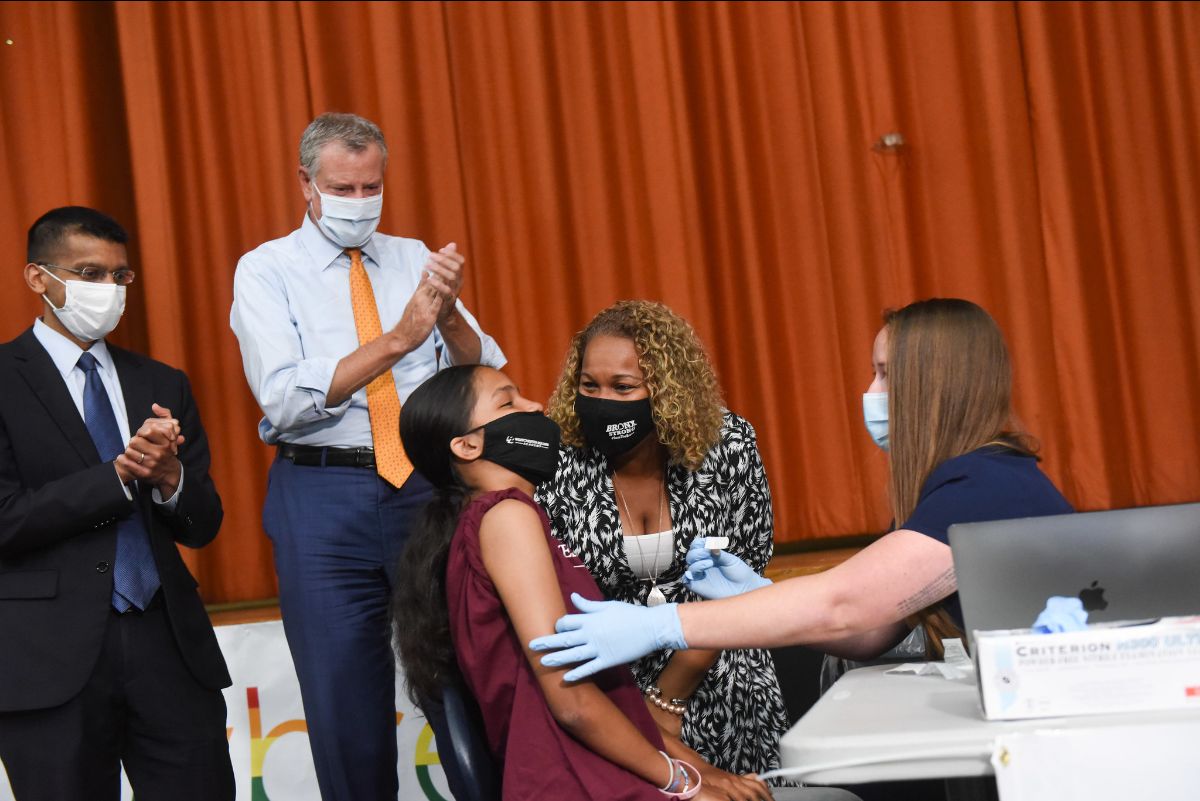
Nov. 8/ U.S. reopens land borders with Canada, Mexico:Travelers who are fully vaccinated against coronavirus will be allowed to enter the United States from Canada and Mexico via land borders and ferry terminals beginning Monday when long-standing travel restrictions are eased.
- What’s happened so far: Both borders were closed in March 2020 as the pandemic took hold, with a month-by-month extension barring leisure travel ever since. Canada reopened its border to vaccinated Americans in August, while also requiring proof of a negative PCR test taken within 72 hours of their arrival at a port of entry. The testing requirement drew the ire of New York Rep. Brian Higgins, who called it an “intrusive, unnecessary step” when paired with the vaccination mandate. While those conducting essential travel are not currently required to be vaccinated to enter the United States, all inbound foreign nationals must show proof of vaccination starting in January.
- The impact: Businesses along the borders hope the return of travel will provide a much-needed boost. According to the U.S. Travel Association, a trade group representing the travel industry, the continued closure of the U.S.-Canada border alone has cost the U.S. economy $1.5 billion in potential travel exports each month.
Nov. 8/ China’s Communist Party plenum: The Communist Party of China’s 19th Central Committee will hold a closed-door meeting Monday, during which it is expected to review ideology and policy and reinforce the authority of President Xi Jinping ahead of next year’s congress.
- What’s happened so far: After last year’s plenary session, China unveiled a new five-year plan outlining social and economic goals, with a focus on economic inequality, environmental issues and technological innovation. Since then, the Communist Party of China celebrated its 100th anniversary with nationalist fervor as tensions continue to rise between China and the United States, especially regarding relations with Taiwan.
- The impact: The sixth plenary session will be an opportunity for Xi and his supporters to emphasize his achievements before the next party congress in 2022, where Xi is expected to win an unprecedented third term in power. New policy may also arise from the meeting, but news will be scarce until the session ends Thursday.
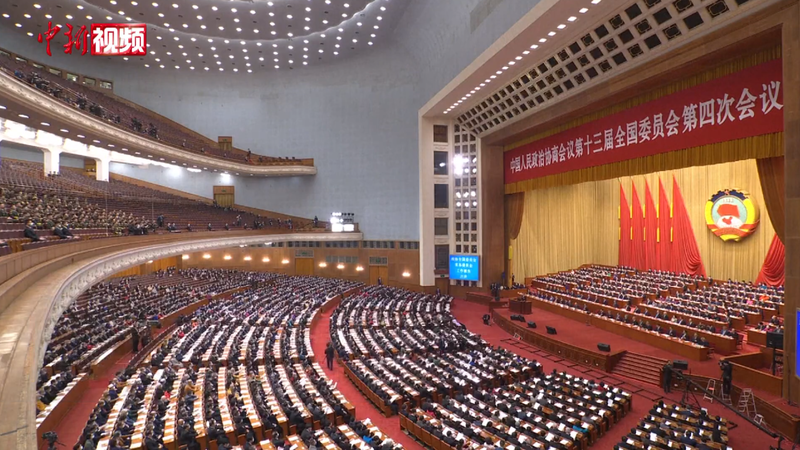
Nov. 8/ Russia starts filling Europe’s gas storage: Russia is expected to start pumping natural gas into Europe on Monday, amid the ongoing energy crisis in the region.
- What’s happened so far: The wholesale price of gas has jumped 250 percent in Europe since the start of 2021, reaching its highest ever price last month. The hike was partly caused by the high demand for natural gas as economies recover, but Russian President Vladimir Putin blamed the crisis on Europe, arguing that European countries had not pumped sufficient volumes of gas into their storage facilities. He has since offered more gas to Europe if requested, in a move critics say is politically-orientated. In the meantime, EU member states have been encouraged to use the EU’s €750 billion ($867 billion) coronavirus recovery fund to invest in clean energy.
- The impact: Ukraine accused Russia of using gas as a “geopolitical weapon” in order to get the Nord Stream 2 project approved. The head of Ukraine’s largest energy company warned Europe risks giving in to Russia if Germany approves the pipeline. According to the White House, President Joe Biden and German Chancellor Angela Merkel discussed during the G20 summit in Rome efforts “to ensure that Russia cannot manipulate natural gas flows for harmful political purposes.” Meanwhile, Putin said such claims were “complete rubbish.”
Nov. 8/ Czech parliament reconvenes: The Czech Republic’s parliament will meet on Monday for the first time since last month’s elections, amid speculation over the formation of a new government in the face of President Miloš Zeman’s ill health.
- What’s happened so far: A group of three opposition parties known as the Together coalition took the largest vote share in the Oct. 9 election, narrowly beating Prime Minister Andrej Babiš’ ANO party. Together was expected to present a coalition agreement to the president before parliament convenes. Zeman, however, was hospitalized the day after the election and rumors have swirled around his capacity to remain in office. On Oct. 19, the Senate’s Constitutional Committee voted to strip Zeman of his powers, with a full Senate vote scheduled for Nov. 5.
- The impact: Under the Czech constitution, Zeman is responsible for accepting the resignation of outgoing Prime Minister Babiš after a new government is formed. The Senate, however, is reportedly working to transfer power to Babiš due to Zeman’s health. If this occurs following the Senate vote, it would be Babiš who would preside over the formation of a new government. It’s unclear whether he would be able to temporarily serve as both prime minister and president, or accept his own resignation as prime minister.
Nov. 10/ Auckland reopens retail and entertainment: Auckland, New Zealand, will begin easing its coronavirus lockdown at midnight Tuesday.
- What’s happened so far: Parts of Waikato, New Zealand, were already downgraded to “step 2” of the country’s three-level lockdown tier this past Tuesday, and Auckland is set to follow. Despite surpassing record-high numbers of cases last week, Prime Minister Jacinda Arden said high rates of vaccination in Auckland allow the country to “move with greater confidence.” More than 75 percent of eligible people have been fully vaccinated in New Zealand, and 88 percent have received the first dose.
- The impact: The step 2 phase of Alert Level 3 will reopen retail and public facilities like museums and libraries, with social distancing and mask guidelines in place. The two-household restriction on outdoor gatherings will also be lifted, allowing outdoor organized events to expand to 25 people.
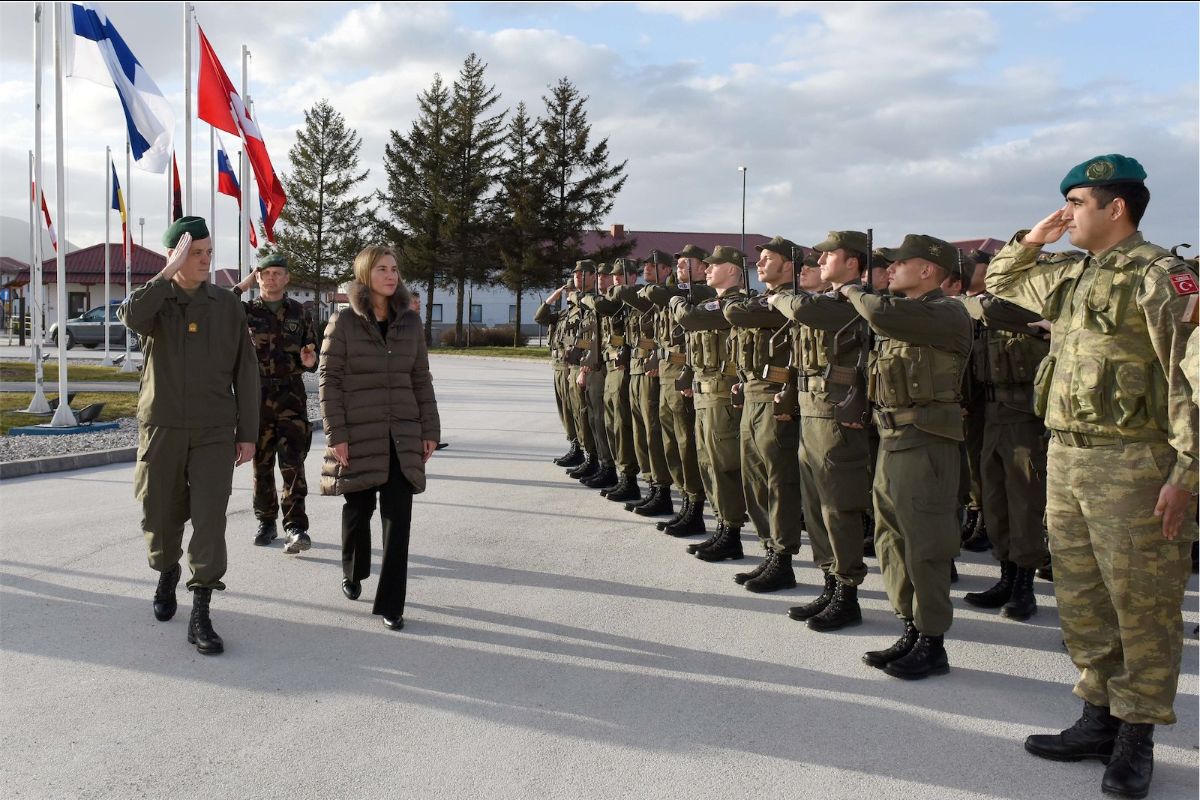
(Photo: European External Action Service / Flickr)
What else matters:
Bosnia political crisis: The international community’s chief representative in Bosnia and Herzegovina is sounding the alarm over recent maneuvers along ethnic lines in the Balkan country over the past few weeks, according to multiple reports. The representative, Christian Schmidt, delivered the report to the United Nations, warning that the very foundation of the Dayton Accords is at risk of unraveling, threatening to upend the agreement that ended the country’s brutal war in the 1990s.
- Watch for: The fears revolve around recent decisions in the country’s ethnic Serb region that could amount to de-facto secession and a rearming along ethnic lines. Most notably, Bosnia’s Serb leader, an advocate of secession, announced they would pull out of the armed forces, the judiciary and the tax body, three pillars of the country’s peace accords. Perhaps the most immediately pressing fear would be a recreation of an ethnic Serb army, a possibility that prompted Schmidt to raise serious concerns. The U.N. Security Council could hold a potentially momentus vote concerning renewing the mandate for EUFOR, the international peacekeeping force in Bosnia. With Russia, the top Serbian ally, reportedly threatening to use its veto on the mandate, things could begin to deteriorate quickly.
Tigray conflict: The conflict in Ethiopia’s Tigray region, which has led to thousands of deaths and displaced millions since last November, worsened in recent weeks. The Ethiopian government declared a nationwide state of emergency this week amid fears that forces of the Tigray People’s Liberation Front (TPLF) could threaten the capital Addis Ababa and Prime Minister Abiy Ahmed called on citizens to “play their part,” urging them to arm themselves and saying “dying for Ethiopia is a duty for all of us.”
- Watch for: As part of the national state of emergency, the armed forces have been given sweeping powers, such as the authority to shut down public communication, arrest those “reasonably suspected of collaborating with terrorist groups” without court orders and the ability to suspend or replace civilian authorities in areas of “insecurity.” Reactions to the deteriorating situation have already started with travel warnings from the United States and United Kingdom. If the Ethiopian military renews its efforts to recapture the Tigrayan capital of Mekele, the situation could worsen further. What’s more, if the TPLF does advance toward Addis Ababa, the move would drag the conflict further south and plunge the nation into an even deeper crisis.
Extended outlook: What’s on our radar in the coming weeks
Nov. 4: India’s foreign minister visits Senegal
Nov. 5: China International Import Expo in Shanghai; Colin Powell’s memorial service
Nov. 7: Nicaraguan general election; Daylight saving time ends in most of Canada and the U.S.
Nov. 8: China’s Communist Party holds sixth plenum; U.S. reopens land borders with Mexico and Canada; Czech parliament reconvenes; Russia starts to fill Europe’s gas storage; indefinite public transport workers strike in Peru begins
Nov. 10: Auckland, New Zealand, reopens retail and entertainment
Nov. 14: Bulgaria presidential election; Argentine legislative elections
Nov. 15: Alex Saab arraignment; Cuba reopens borders to tourism
Nov. 17: Gulf of Mexico oil and gas auction
Nov. 20: 89th General Assembly of Interpol in Istanbul
Nov. 21: Chilean general election to elect a new president and National Congress
Nov. 22: Deadline for U.S. federal employees to be fully vaccinated
Nov. 23: South Australia will ease border restrictions for double-vaccinated people
Nov. 25: U.S. Thanksgiving
Nov. 28: Honduran general election; Hanukkah begins
Nov. 29: Opening statements in Ghislaine Maxwell trial
Dec. 1: SCOTUS hears arguments in challenge to Mississippi abortion law; 2021 FIFA Arab Cup
Dec. 4: Gambian presidential election
Dec. 18: Taiwan referendum

